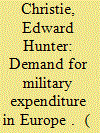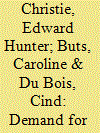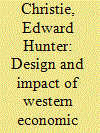| Srl | Item |
| 1 |
ID:
164520


|
|
|
|
|
| Summary/Abstract |
A variant of established work on the demand for military expenditure is developed based on a practical concept of fiscal space from the perspective of short-term government choices concerning public expenditures. A new indicator, referred to as fiscal capacity, is defined and used as a candidate explanatory variable in an empirical model of European defence spending over the 2007–2016 period. Fiscal capacity is found to outperform simpler measurements of economic conditions, notably GDP growth forecasts, in explaining changes in defence spending efforts as a share of GDP. Regarding security environment variables, the results suggest that Russia has recently come to be seen as a potential military threat by European nations, leading to defence spending increases, the more so the shorter the distance to stationed or deployed Russian forces, and particularly so by those European nations that have a land border with Russia. A prospective exercise is then carried out in order to assess the capacity of EU member states that are also members of NATO to reach NATO’s 2% goal for defence spending over a mid-term horizon.
|
|
|
|
|
|
|
|
|
|
|
|
|
|
|
|
| 2 |
ID:
192039


|
|
|
|
|
| Summary/Abstract |
We explore the possibilities and limitations of models of the demand for military expenditures, as against additional kinds of cross-country analyses, with an empirical focus on the Indo-Pacific region. Our research bridges a gap between the Defence Economics and International Relations literatures by developing testable security alignment hypotheses and by testing these hypotheses in three ways: with demand modelling on total expenditures, with analyses on estimated stocks of imported armaments, and with qualitative analyses of trends in defence cooperation between states. We find consistent evidence across research methods of an increase in threat perceptions towards China since around 2012 and of balancing behaviour by US allies and by two non-allies. As compared to standard demand modelling, our hypothesis-based mixed methods approach allows for a clearer treatment of samples with mixed and shifting security alignments and of states that stabilise or reduce expenditures in the face of rising threat perceptions.
|
|
|
|
|
|
|
|
|
|
|
|
|
|
|
|
| 3 |
ID:
145944


|
|
|
|
|
| Summary/Abstract |
The economic sanctions imposed by the West against Russia in 2014, following the latter’s aggression in Ukraine, were deliberately limited but nevertheless significant, their impact distinguishable from that of the fall in oil prices that occurred in late 2014. Edward Hunter Christie argues that these sanctions, in combination with credible threats of further sanctions, appear to have had an effect in limiting Russian aggression in Ukraine, even though they have not led to a reversal of facts on the ground. This article also explores the possibility that, in the absence of other coercive components to underpin diplomatic efforts, the earlier application of more robust economic sanctions might have had stronger effects on Russia’s behaviour.
|
|
|
|
|
|
|
|
|
|
|
|
|
|
|
|